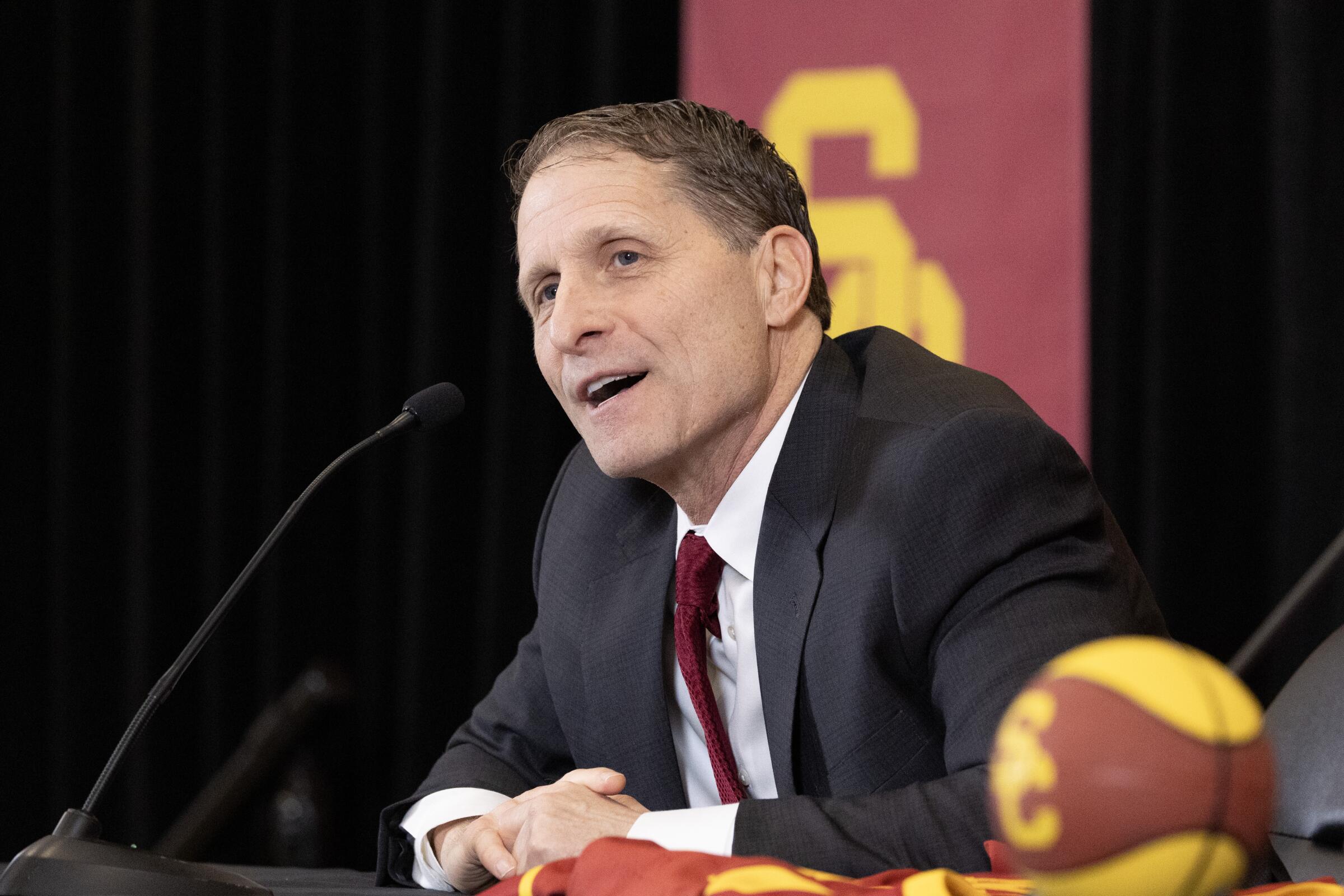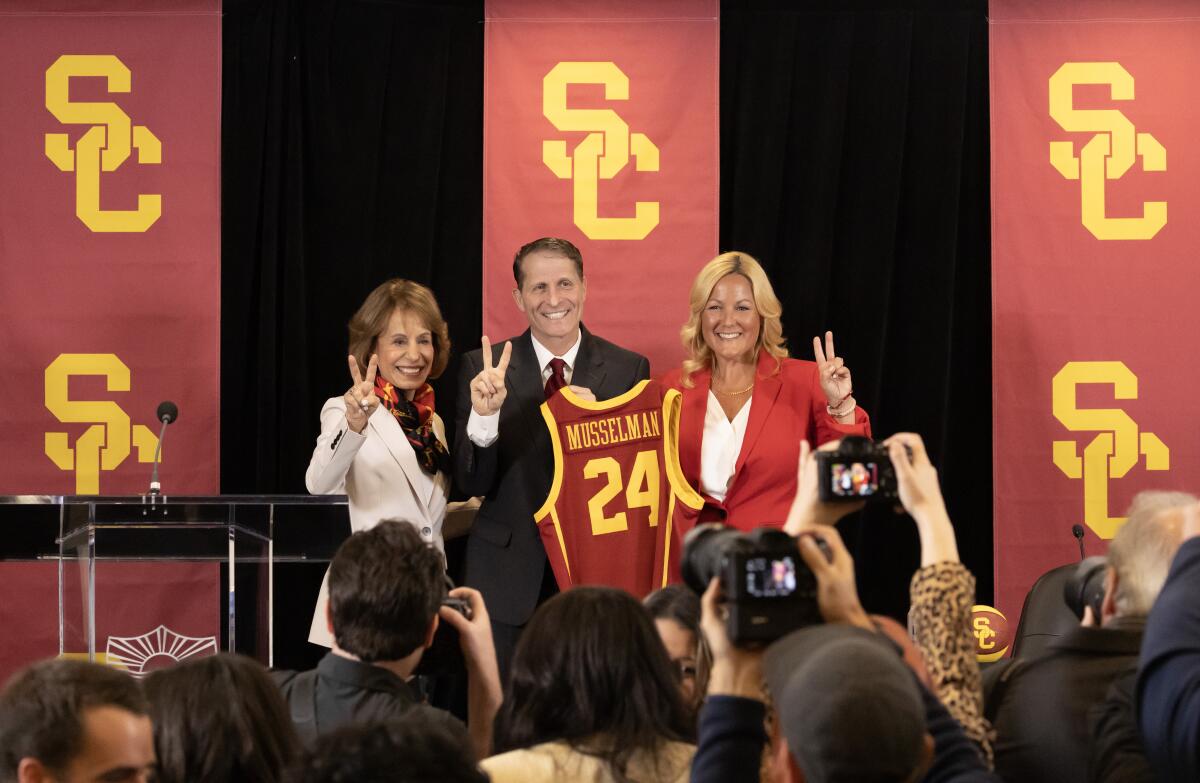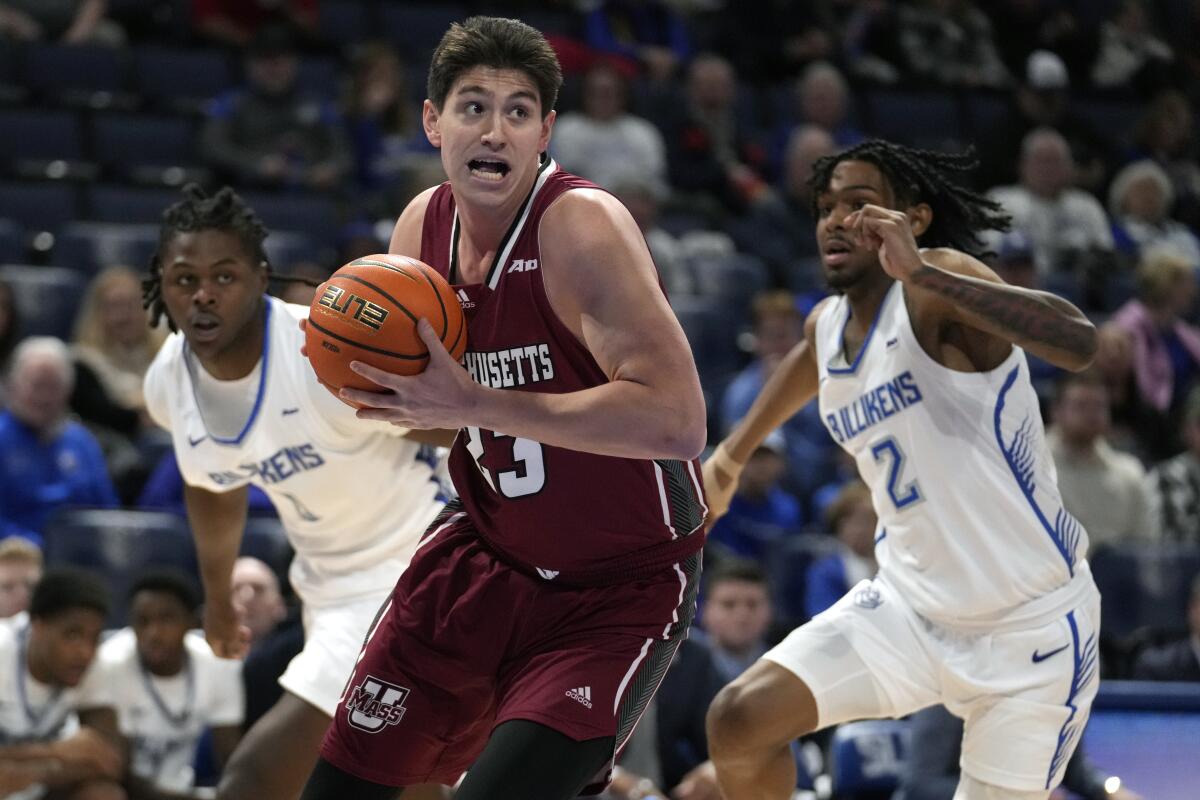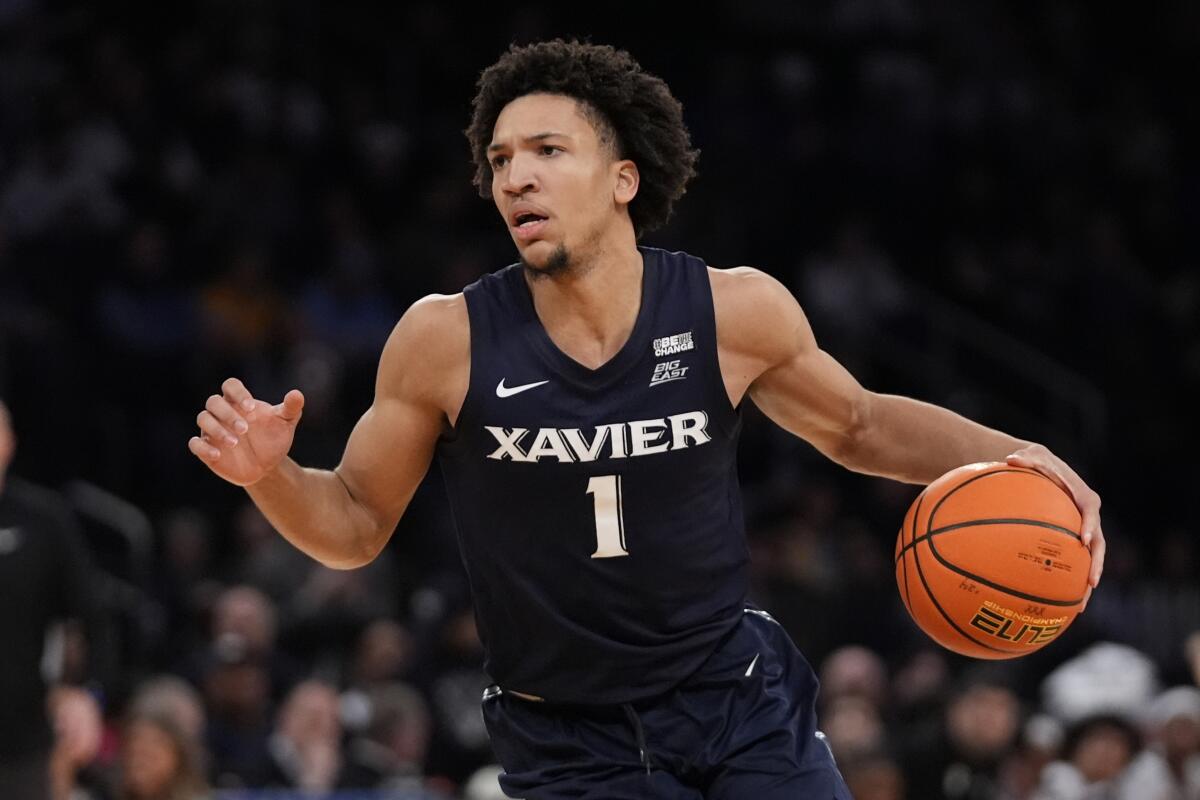Go beyond the scoreboard
Get the latest on L.A.'s teams in the daily Sports Report newsletter.
You may occasionally receive promotional content from the Los Angeles Times.

By the time Eric Musselman had a moment to take stock of his new roster this spring, there wasn’t much team left for the new USC coach to evaluate. Three players had departed for the draft. Six more hit the transfer portal.
By mid-April, Harrison Hornery, the stretch-four from Australia, was the only scholarship player left for the new coach to inherit. Hornery averaged 3.3 points as a junior.
Mass exodus isn’t out of the ordinary in this uncertain era of the transfer portal. But the barren state of USC’s roster would make for a particularly daunting start for Musselman and his staff, who essentially had a month to piece together an entirely new team with transfers who entered the portal.
“Everything’s happening so quick,” Musselman said, “and I don’t know and our staff doesn’t know — what are the recruiting points to hit? So we’re kinda learning on the fly.”
Eric Musselman has a reputation for injecting life into stagnant basketball programs, and USC’s leadership is hoping he will do the same for the Trojans.
USC’s new coaches and their families had yet to find places to stay in L.A. So in April, with the clock ticking on the transfer portal, Musselman suggested renting a house with his assistants in Manhattan Beach for a month. USC administrators signed off. And by June, as the Trojans began summer workouts with a full team of transfers this week, the coach declared that decision was “probably the smartest thing we did.”
The rental home sat just a few blocks off the Strand in Manhattan Beach, close enough to the ocean that coaches could hear the waves lapping on the sand late at night. It made for a picturesque backdrop when FaceTiming a prospective transfer — to the point coaches were encouraged to make their calls within direct view of the beach.
It was under that roof and amid a fresh ocean breeze that a new foundation for USC hoops was forged over 30 breakneck nights of FaceTimes, strategy sessions and near-daily trips to the same South Bay pizza parlor. Musselman and his assistants — son Michael Musselman, Todd Lee, Will Conroy, Anthony Ruta and director of basketball operations Caleb Cline — would spend almost every waking minute of that time together. Ruta and Michael Musselman even shared a bunk bed.
“It wasn’t a frat house,” Musselman said, “but it was a Portal House.”

The coaches of the Portal House worked together on campus all day, ate every meal together and every night they’d return to their beachside rental to recruit for five straight hours, trading intel on transfers, managing a flurry of messages and discussing strategy until sometime past midnight, when Musselman finally announced he was turning in.
By then, having worked nearly from sunrise to midnight, the group was exhausted. But no one dared go to bed before the boss, who was usually up by 5 a.m. for a seven-mile walk.
“It’d be like midnight, and I’d say, ‘Hey, what about that guy from so-and-so college?’ ” Musselman said with a smile.
It wasn’t until he headed up the stairs toward the master bedroom that his assistants would retreat to their corners of the house to call their wives.
“When he says he’s going to sleep,” Conroy said, “you see everyone [reaching for their phones] like, ‘Hey babe, sorry, just finished work.’ ”
“You just felt like, if Michael Musselman was over there on the phone with a recruit, and Anthony Ruta was talking to a recruit, it’s like, ‘I can’t be on FaceTime with my wife. I gotta be FaceTiming with a kid.”
In the aftermath of Bronny James’ workout for the Lakers, here’s a breakdown of the top players the team could target in the 2024 NBA draft.
That’s not to say sleepless nights at the Portal House were for everyone.
“Ruta was the first out of there, man,” Musselman said. “I mean, he found a place and he was out. No furniture, nothing, like, ‘I’ve had enough. I can’t.’ ”
The relentless approach to roster-building paid dividends … eventually. Musselman wanted players who were long and versatile, capable of filling in at multiple positions and switching on defense. USC coaches contacted countless options in the portal, but ultimately zeroed in on experienced, mid-major standouts searching for new opportunities. At least then there was film to consult.
Not everyone could see the vision right away. Some of the top targets USC brought in on early visits chose not to commit because of the uncertainty of the roster.
“A lot of it was, ‘Well, we didn’t know who we were going to play with,’” Musselman said. “It was hard to get the first two, three, four guys to commit.”

Josh Cohen, a 6-foot-10 stretch-four from Massachusetts, came first. Next was Clark Slajchert, a sharpshooting guard from Penn. It took 10 more days before the Portal House could celebrate another commitment. But after that, they rolled in one after the other.
Bryce Pope, a shooting guard from San Diego. Matt Knowling, a versatile wing from Yale, Saint Thomas, a small school standout from Northern Colorado. Rashaun Agee, a big man from Bowling Green. Chibuzo Agbo, a wing scorer from Boise State. All five committed within a three-day span, wooed by the promise — and fire — of USC’s new coach.
“I love that feeling of, you know your coach is going to bring that every day, bring that energy and hold guys accountable,” Agbo said. “I really love that.”
Some opposing coaches actually tried to use it against Musselman.
“They were just kind of hating on Coach Muss and telling me he’s gonna pressure you to commit, he’s gonna do this, he’s gonna do that, he’s crazy,” Thomas, the Northern Colorado transfer, said. “But aren’t we all crazy to win? That’s what I’m all about.”
In early May, near the end of their 30-day odyssey, USC’s staff sat on the front porch of the rental in Manhattan Beach, when Musselman got a call. Despite their dogged portal pursuit, the Trojans still didn’t have a starting point guard. But on the other line was Xavier’s Desmond Claude, the Big East’s most improved player in 2023, whom USC desperately needed.

He wouldn’t be available until the fall because of surgeries on both elbows. But he was coming to USC.
It was a big moment in the course of their rebuild. Musselman roared from the porch, pumping his fist.
“People were in the houses, looking out,” Conroy recalled. “‘Like where’s this noise coming from?’”
That energy was still palpable Thursday, as USC’s fleet of 11 transfers flew up and down the practice court during a whirlwind of a summer workout, offering an early glimpse at the returns from a rapid rebuild. What that picture might look like in six months is anyone’s guess. But for now, it was one of constant, relentless motion, which Musselman said more resembled an SEC team than a Big Ten one.
“I don’t want to do what I did last year,” said Musselman, who finished 16-17 with Arkansas last season, “but I want to do what we did in other years, which is create a team that cosmetically, people are like, ‘I want to go watch that team play.’ And then, a team that opposing teams respect for how hard they play.”
Former USC football player Abdul-Malik McClain agrees to a plea bargain for his role in allegedly orchestrating a fraudulent COVID-related benefits scheme.
That was the plan that emerged out of the Portal House, anyway. But the short-term lease has long since run out, the Musselmans now officially set to move into their new home in the coming days. Moving trucks were en route to his home in Fayetteville on Thursday, bound soon after that for the South Bay.
But still, the new coach can’t help but feel a bit wistful thinking back on the month his staff spent rebuilding USC’s roster from scratch.
“[Musselman] moved into his new place,” Conroy said, “and still he kept texting us, like, ‘I miss the Portal House!’ ”
Go beyond the scoreboard
Get the latest on L.A.'s teams in the daily Sports Report newsletter.
You may occasionally receive promotional content from the Los Angeles Times.